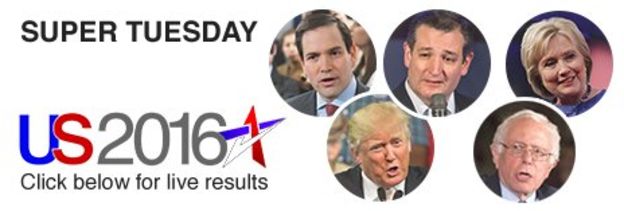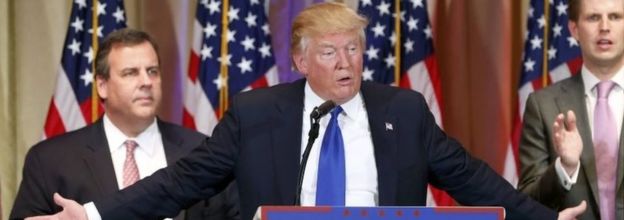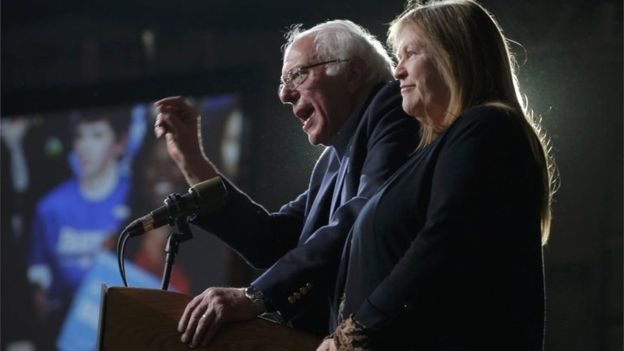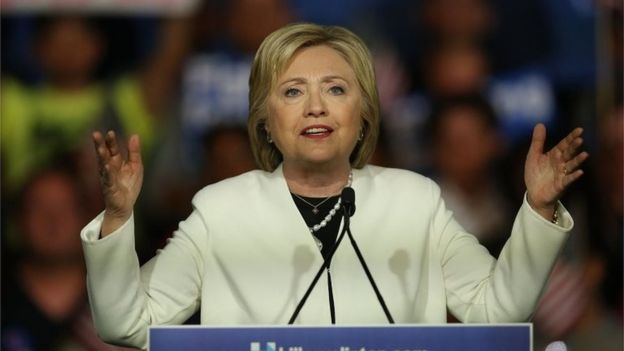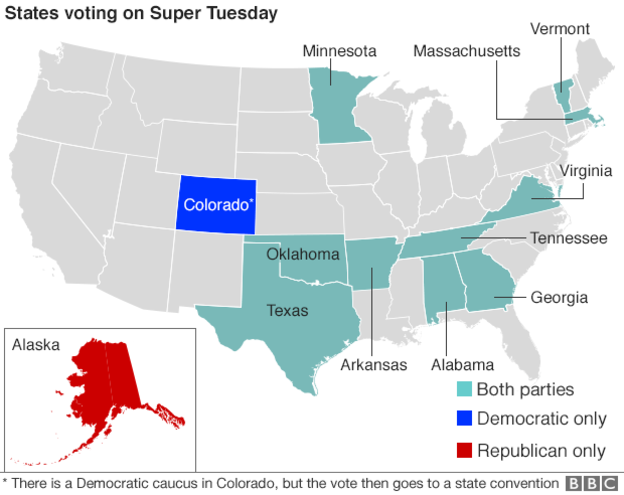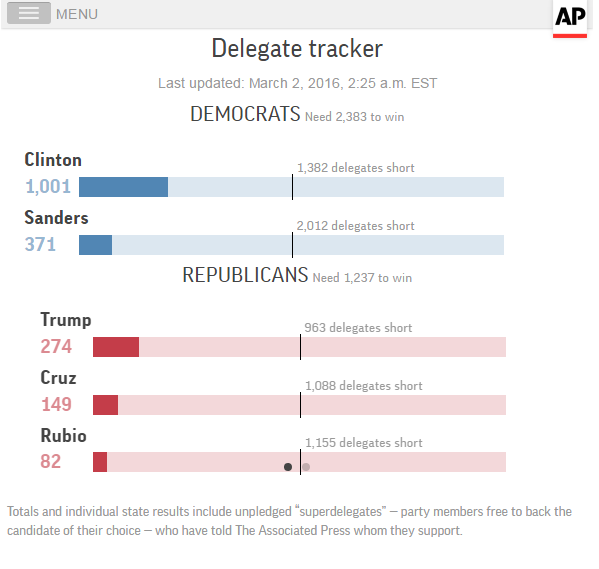Clinton and Trump tighten election grip

Democrat Hillary Clinton and Republican Donald Trump have both won the most states on the biggest day of the race for the US presidential nominations.
Alabama, Georgia, Tennessee and Virginia were among the states where both triumphed. Mr Trump was defeated by Ted Cruz in Texas and Oklahoma.
Democrat Bernie Sanders won four, including his home state of Vermont.
Super Tuesday sees 11 states voting on the biggest single day ahead of the 8 November presidential election.
Super Tuesday states won so far:
Donald Trump (Republican): Alabama, Georgia, Massachusetts, Tennessee, Virginia, Arkansas, Vermont
Ted Cruz (Republican): Texas, Oklahoma
Marco Rubio (Republican): Minnesota
Hillary Clinton (Democrat): Alabama, Georgia, Tennessee, Virginia, Arkansas, Texas, Massachusetts
Bernie Sanders (Democrat): Vermont, Oklahoma, Minnesota, Colorado
The former secretary of state and real estate mogul entered Super Tuesday as the favourites to win the vast majority of states for their respective parties.
In her victory speech on Tuesday, Mrs Clinton appeared to already be looking towards a potential presidential race against Donald Trump, saying: "The stakes in this election have never been higher and the rhetoric we're hearing on the other side has never been lower."
Donald Trump, for his part, insisted that he was a "unifier" who could put internal fighting in the Republican party behind him to focus on a general election race against Mrs Clinton.
"Once we get all this finished, I'm going after one person — Hillary Clinton," he told reporters in Florida, where he has been campaigning ahead of the state's vote later this month.
The billionaire also insisted he had "expanded the Republican party", referring to higher turnout from a broad demographic in states that have already voted.
Texas Senator Ted Cruz called on his rivals to drop out of the race, which he says would enable him to contend Mr Trump's lead more effectively.
Florida Senator Marco Rubio, who was hoping to emerge as the main alternative to Mr Trump, won his first state on Tuesday in the Minnesota caucuses.
Analysis — Jon Sopel, BBC North America editor, Florida
This was a man not looking to the next primary, the next bit of slog along that long and exhausting road. This was a man with an eye on the much bigger fight in November, and his presumptive opponent Hillary Clinton.
He graciously congratulated Ted Cruz over his wins in Texas and Oklahoma. No mention last night of him being the biggest liar he's ever met. And no demeaning of Marco Rubio either. Were it not for the unmistakable blond hair and the family members at his side, you might have been forgiven for thinking an impostor had entered the room.
But no it was Donald 2.0 that we had with us. The trouble, though, when you upload a new operating system is there are inevitable bugs and glitches. And the new OS takes a bit of getting used to.
And there will be many who say what brought me to the product was the original software. So can and will the new magnanimous Donald be able to keep up this new modus operandi, and will his army of fans like what they see?
This was a strikingly different Donald Trump who met reporters on Tuesday night. His tone was conciliatory. He was quietly spoken. He said he would be a unifier — of the Republican Party, of the nation. He didn't crow and he didn't claim to be the nominee, but he clearly thinks the primary race is effectively over.
Mr Trump has stunned the Republican establishment to become the party's front-runner. Despite his controversial policies on immigration, the former reality TV star has been consistently polling well above his rivals — Ted Cruz, Mr Rubio, Mr Kasich and retired neurosurgeon Ben Carson.
Both Senators Cruz and Rubio have ramped up their anti-Trump rhetoric over the past week, in a bid to halt his commanding lead in the race. The outcome of Super Tuesday will be critical for both candidates to remain the race.
Mr Trump has faced heavy criticism this week over his failure to disavow David Duke, a leader of the white supremacist Ku Klux Klan, who has endorsed the Republican candidate. The front-runner later said he had on several occasions in the past disavowed Mr Duke.
On the Democratic side, Mrs Clinton had already secured three wins in the first four early-voting states and has led significantly among blocs of black voters there.
Bernie Sanders, who describes himself as a democratic socialist, has put up an unexpectedly strong challenge against the former secretary of state after his sweeping victory in New Hampshire last month.
Alongside wins in Vermont and Oklahoma, he also was projected to win the Democratic Colorado caucuses — although this was merely a projection, as delegates do not vote until the state convention in April.
Addressing cheering supporters at his victory speech in Vermont on Tuesday, Mr Sanders aimed a jibe at the Republican front-runner saying: "We are not going to let the Donald Trumps of the world divide us."
The proportion of vote won equates to the number of delegates who will then go on to the Democratic and Republican parties' national conventions in July to officially choose the nominees for the presidency.
Super Tuesday is pivotal because it allocates nearly a quarter of the 2,472 Republican delegates and some 20% of all delegates for the Democrats.
Follow the primaries race with the delegate tracker, provided by the Associated Press (AP)
Политика конфиденциальности | Правила пользования сайтом
